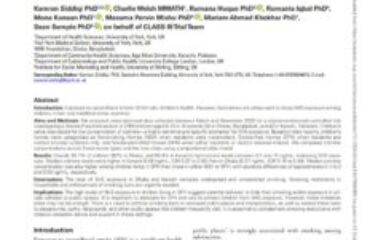Second-hand smoke (SHS) is a serious health hazard costing 890,000 lives a year globally. Women and children in many economically developing countries are worst affected as smoke-free laws are only partially implemented and homes remain a major source of SHS exposure. There is limited evidence on interventions designed to reduce SHS exposure in homes, especially in community settings. Following a successful pilot, a community-based approach to promote smoke-free homes in Bangladesh, a country with a strong commitment to smoke-free environments but with high levels of SHS exposure, will be evaluated. The study aims to assess the effectiveness and cost-effectiveness of a community-based intervention, Muslims for better Health (M4bH), with or without Indoor Air Quality (IAQ) feedback, in reducing non-smokers’ exposure to SHS in the home. To read more, choose either of the two buttons below.



